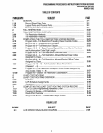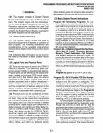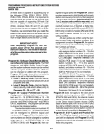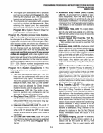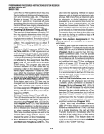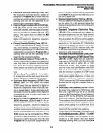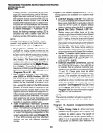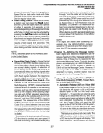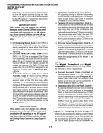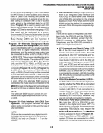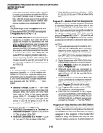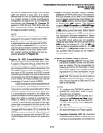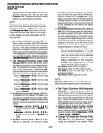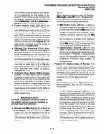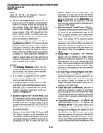
always 10 seconds. Pause timing applies to
Speed Dial on data calls made with Data
Interface Units (DIUs), as well as to Speed
Dial for regular voice calls.
l
Flash Timing, Code4-When on a CO line,
a station user can press the Flash button
and the CO line will open (flash) for a period
of either 2 seconds, 0.2 seconds, or 0.5
seconds depending on this assignment mode
with Code 4. A flash can also be activated by
pressing the Cnf/Trn button and dialing 4
5. In general, this choice reflects whether to
disconnect and regain dial tone (2 seconds)
or to use PBX or CENTREX features which
require a flash signal (0.5 seconds). This
flash timing also applies to flashes inserted
when dialing via Data Interface Units (DIUs).
NOTE:
The 0.2 seconds option is not normally used
in the United States.
l
Pause After Flash, Code 5-Some Central
Offices or CENTREX facilities require a pe-
riod of time after a flash signal before they
can accept dialing signals. A selection of
pause timing can be made with Code 5 to
automatically delay any dialing signals after
flash. This timing applies to speed dial calls
(with flash signals between the telephone
number digits) as well as manual dialing.
l
QRCWK4RCU Seize Time, Code g-One
channel of the QRCU/K4RCU Dual-tone
Multi-frequency (DTMF) receiver/decoder
is seized when it is needed for the decoding
process, such as with a standard telephone
with a DTMF dialpad. When placing outgo-
ing calls with DTMF standard telephones,
the talk path to the outside party is not “cut-
through” until the QRCU/K4RCU circuit is
released. The release time of the QRCU/
K4RCU channel can be programmed with
Code 9 for a time between one and nine
seconds (initialized timing is four seconds);
the release time is the time it takes to release
the QRCU/K4RCU circuit after the last digit
is dialed.
The choice of timing is a trade-off between
CO line time to connect and user speed. If
the time is too long, the outside called party
StCTlONlOO-816-302
MARCH1993
may answer before the voice path is “cut-
through,” and the caller will not be heard. If
the time is too short, a standard telephone
user inputting DTMF tones could be cut off
prematurely from using other features, such
as Speed Dial, or Toll Restriction may be
defeated. (To prevent Toll Restriction de-
feat, force standard telephones to dial out-
going calls via Least Cost Routing (LCR).
When dialing via LCR, standard telephones
cannot defeat Toll Restriction if the QRCU/
K4RCU times out.)
NOTE:
If no digits are dialed after accessing an
outside line, the QRCWK4RCU remains
seized for 15 seconds and then drops; how-
ever, the CO line remains connected.
Program 13-Defining the Message Center:
Each digital and electronic telephone can re-
ceive a maximum of four message waiting indi-
cations. One of these four is reserved for the
designated Message Center. Typically, the tele-
phone accompanying an Add-On-Module on
DK8 or a DSS console (DDSS or HDSS) on
DK16 will be the Message Center. However, if
incoming traffic to an ADM or a DSS console
attendant is heavy, another station may be
assigned to be the Message Center.
Program 15-Assigning Dial Pulse (DP)/Dual-
tone Multi-frequency (DTMF), Tenant Serv-
ice to Individual CO Lines:
l
Automatic Release (AR) on Voice Mail
(VM) Calls, Code O-Some Central Offices
will send the AR signal-a 95 or 450-milli-
second open of the CO line loop-after
(typically 1 - 15 seconds) an external party
hangs up to disconnect the CO line. If an
outside party hangs up before or after a VMI
auto attendant hookflashes to transfer a
call, the Central Office will send the AR
signal to the STRATA DK8 or DKI 6 system,
which will then send “D” (Program 31, LED
15) tone to the VM/auto attendant device to
release and clear the port for another call.
This feature is active on all voice calls. The
LCD of a station which is disconnected from
a CO line by the AR signal will display, “CO
LINE HANG UP” and the station will receive
2-7



